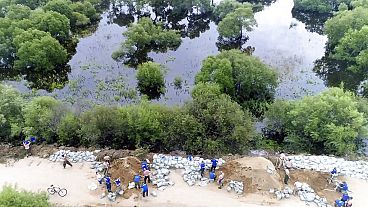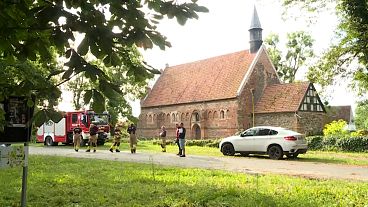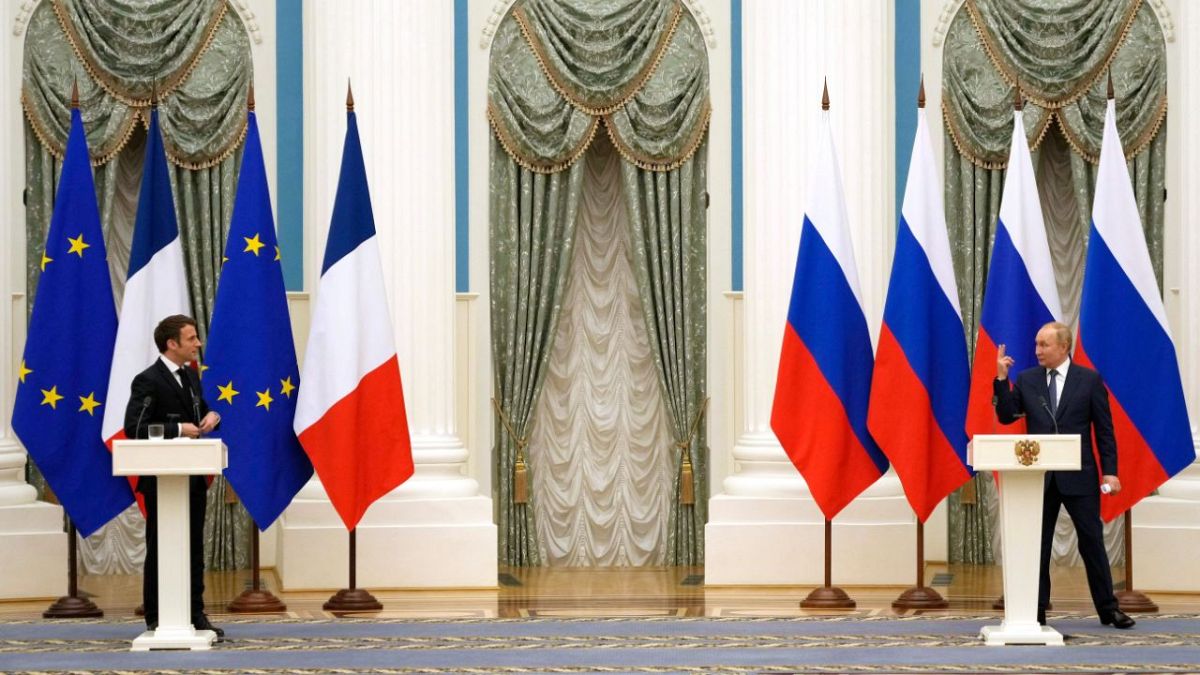The French president has been strongly criticised after repeatedly stressing the need to chart a diplomatic path with Russia once the fighting ends in Ukraine.
Criticism of Emmanuel Macron continued on Monday, following comments reported at the weekend in which the French president repeated his belief that it is important not to "humiliate Russia".
Insisting that France had a role as a "mediating power", the recently re-elected leader said that when the fighting stopped, it would be necessary to "build an exit route by diplomatic means".
Macron's comments in an interview with French regional media echoed similar remarks in a speech in May.
They have been seized upon by critics, who accuse him of a stance that risks selling Ukraine short and may even encourage Vladimir Putin to intensify Russia's aggression.
What did Macron actually say?
The French president's comments came towards the end of a wide-ranging interview carried out on Friday and published in French regional newspapers. Much of it focused on domestic issues ahead of upcoming parliamentary elections.
Asked whether he intended to visit Kyiv soon, Macron said he had gone to the Ukrainian capital "in February to try to avoid war" and was ruling nothing out. Several other Western leaders have made trips to Ukraine since the war started.
The president outlined the extent of Western support for Ukraine, highlighting last week's EU agreement to limit Russian oil imports.
"We have just taken a historic decision with the sixth sanctions package with an embargo on 90% of Russian oil. We want to increase financial and military support for Ukraine. And finally, we want to do everything we can to get grain out of Ukraine. The Ukrainian people are fighting bravely, they deserve our support and respect. Arms deliveries to Ukraine are continuing," he said.
He was then asked whether there was a risk of escalation, given arms deliveries and the wish of some of Russia's neighbours to join NATO.
"The situation is worrying, it's true. That's why I've put so much time and energy into it. I have lost count of the conversations I have had with Vladimir Putin since December. In all, about a hundred hours in transparency and at the request of Volodymyr Zelenskyy. We must not humiliate Russia so that the day the fighting stops, we can build a way out through diplomatic channels. I am convinced that it is France's role to be a mediating power," Macron replied.
The French president said he had told his Russian counterpart that he had "made a historic and fundamental mistake for his people, for himself and for history", when asked what his perception was of Putin.
"Russia is still a great people. I think he has isolated himself. It is one thing to isolate yourself, but it is difficult to get out of it."
What did Macron say in May?
In a speech to the Conference on the Future of Europe in Strasbourg on May 9, Emmanuel Macron warned against aggravating tensions. He said that once the war ends, Moscow and Kyiv will eventually have to sit down and negotiate with each other.
"We will have a peace to build tomorrow, let us never forget that," Macron said. "We will have to do this with Ukraine and Russia around the table. The end of the discussion and the negotiation will be set by Ukraine and Russia. But it will not be done in denial, nor in exclusion of each other, nor even in humiliation."
The French president said it was important to "never give in to the temptation either of humiliation or of a spirit of revenge". He referred to the "diktat" imposed on Germany in 1919 by the victors of the First World War, with heavy territorial losses and reparations, which led to a new world war in 1939-45.
How have Macron's critics responded?
"What would Macron say to that girl in Ukraine?" the President of the Estonian parliament's foreign affairs commission, Marko Mihkelson, commented on Facebook on Monday, above a picture of a young amputee in hospital. "And to the thousands of others whose lives have been shattered forever as victims of an evil empire."
The politician went on to accuse France and Germany of policy failures in dealing with Russia over the past decade.
"France and Germany should think very seriously about what they did wrong anyway, that the Normandy format (but Macron dreams of peace mediation) paved the way for a new Russian war of conquest. Perhaps it is time to admit the bankruptcy of our Eastern policy and start afresh. Estonia can be a good ally here."
Ukraine's Foreign Minister Dymytro Kuleba criticised Macron's stance on Twitter on Saturday, saying that "calls to avoid humiliation of Russia can only humiliate France and every other country that would call for it. Because it is Russia that humiliates itself".
Some of the strongest criticism has come from ex-US President Barack Obama's former ambassador to Russia, Michael McFaul, now a professor at Stanford University.
"Putin is making plans to annex newly conquered territory. I hope Macron will not acquiesce to just blatantly illegal action in order to not humiliate Putin. Those who annex territory in the 21st century should be not only humiliated but stopped," he posted on Twitter on Monday.
Even some Macron sympathisers have criticised the French president for his emphasis on the question of avoiding humiliating Russia, while pointing out his support for Ukraine.
"What annoys me about @EmmanuelMacron's warning not to humiliate Russia is not just that it sounds callous, after Bucha, but that it is yet another example of discussing the long-term relationship with Russia as if it wasn‘t influenced by the short-term development of the war," tweeted historian and writer Helene von Bismarck.
Mujtaba Rahman of the Eurasia Group argued that Macron's comments were contributing to a misunderstanding of the French president's message.
"Macron’s repeated use of this phrase – “Russia must not be humiliated” - is becoming a problem. He needs to explain exactly what he means. His critics understand him to mean that Putin needs some kind of going-home present. But Macron has never said anything of that kind," he said on Twitter.
He added that talk of the future relationship with Russia once the conflict is over was "too abstract and too distant an issue to dwell on while Russia is killing civilians & flattening towns".












